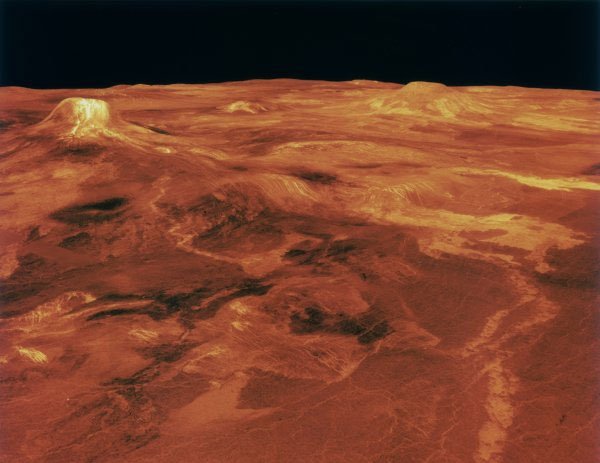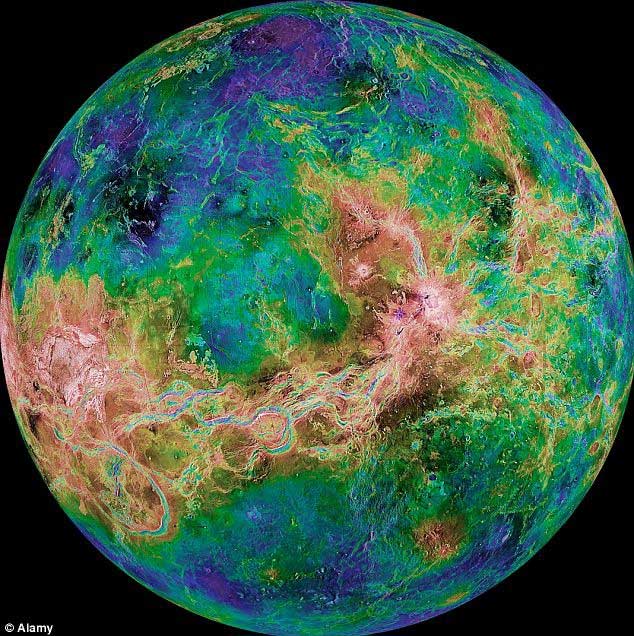This planet may once have brought life
Scientists have created an early simulation of Venus, revealing that the planet was once cool and suitable for life .
One of the harsh facts about the Solar System is that despite possessing eight beautiful planets, the Earth is still the only 'home' that exists that we know of.
Based on ancient climate simulation models by scientists at the Goddard Space Research Institute (GISS) of NASA in New York, the new study suggests that K im may be suitable for the future. living.

Computer simulation of the surface of Venus in 1990. (Image: Getty)
Was there any water?
However, Venus today has a surface temperature of 462 degrees Celsius, the atmosphere is almost entirely carbon dioxide (CO2), 90 times thicker than Earth's atmosphere.
The Earth and Venus once formed from the same primordial cloud, roughly the same size, located at the same distance from the Sun. If Earth existed water, it would have been possible for Venus to have water, as confirmed by US space probes. Many chemical signs of water have also been detected in Venus's atmosphere.
In addition, the surface of Venus also appears high ground masses and the ocean basins are relatively shallow like the Earth, which means that the surface of Venus has a suitable terrain to contain water. However, this planet also has certain problems.

An image of Venus' surface synthesized from multiple NASA radars.The planet's surface is hot enough to melt lead.(Photo: NASA).
The shorter distance from the Sun causes Venus to receive 40% more heat and light than Earth. In the beginning, that was not the problem. During the birth of the Solar System, this central star was 30% dimmer than it is now, but its brightness and temperature increased day by day.
Worse, the rotation of Venus is extremely slow. A day on Venus is about 117 days long on Earth. The slow day and night cycle makes Venus seem to be roasting on an everlasting skewer. Fires occur consecutively due to close exposure to sunlight for too long. Earth's rotation is much faster, never making any part of our planet heat up too long.
For a long time, the researchers thought that the slow motion was due to the atmosphere being so thick, the gravity of the Sun dragging heavy air, thus creating a kind of tidal restraint. But if that's the reason Venus is spinning slowly, it also means that the planet has always had that dense atmosphere. If so, it is always too hot to survive. This is a new hypothesis formed based on old arguments.
Ever had bacteria?
Scientists have created a model to simulate early Venus with a thinner atmosphere like Earth, which rotates due to other factors, including the gravity of the Sun on the planet's geological surface. not the atmosphere. That suggests that Venus was cooler, at least in its infancy.
The simulation has resulted in its surface being warmed up, creating rain by forming a thick layer of clouds, the layer of cloud acting like an umbrella that shields the planet's surface from most of the heat from the Sun.
But this did not last. As the Sun gets brighter and hotter, Venus also heats up. Surface water evaporates into the atmosphere, releasing hydrogen and oxygen. Hydrogen gas then flies out into space.
Things get worse. If Venus ever had plate tectonics, this process would begin to stall, in part because of the lack of water so the tectonic plates could move. Without tectonics, carbon in the atmosphere can't circulate underground, the greenhouse effect is getting worse.

Life is always the pursuit of mankind everywhere in the universe.(Photo: Dailymail).
According to some theories, as conditions on Venus worsen, microbial life may have migrated to a planet with a more stable atmosphere, similar to the way bacteria attach themselves to particles. Micro particles are often found in Earth's atmosphere.
However, some scientists speculate that micro-organisms that prefer to live in extreme thermophilic conditions and low pH may exist in the upper acidic layers, which have lower temperatures than the atmosphere of Venus.
Bacteria that float are almost elusive. However, for mankind - the lonely Earths yearning to explore the universe, finding a glimmer of light is also a promising start.
- Is there life on Venus?
- New discovery of geological life on Venus
- The top 5 most Earth-like planets have been discovered
- Discovering the planet can survive life
- Reveal the living world on the 'dead planet'
- The most Earth-like planet shows up
- Meteors bring 'the origin of life' to Earth
- Life can be born first on a diamond planet
- A collision can start life on Earth
- Detecting planets that have life outside the Solar System
- Life can spread among planets
- 60 billion planets can support life
- Earth-like planets may contain life
- 40 billion planets can sustain life
 Van Allen's belt and evidence that the Apollo 11 mission to the Moon was myth
Van Allen's belt and evidence that the Apollo 11 mission to the Moon was myth The levels of civilization in the universe (Kardashev scale)
The levels of civilization in the universe (Kardashev scale) Today Mars, the sun and the Earth are aligned
Today Mars, the sun and the Earth are aligned The Amazon owner announced a secret plan to build a space base for thousands of people
The Amazon owner announced a secret plan to build a space base for thousands of people